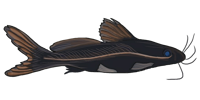| Scientific Name | Brochis (sub-clade 3) arcuata Elwin, 1938 |
| Common Names | CW036, Super Arcuatus Cory Bågpansarmal (Sweden), Buepansermalle (Denmark) |
| Type Locality | Amazon River (aquarium specimen). |
| Pronunciation | bro kiss sub clade four |
| Etymology | This specific epithet refers to its bowed (arcuatus=bowed, as in bent like an archer's bow) colour pattern. |
| Articles | |
| Size | 60mm or 2.4" SL. Find near, nearer or same sized spp. |
| Identification | The colour pattern forms an even arch (hence the scientific name) of dark stripe from the snout to the lower back. Sometimes the cleithrum will have an iridescent gold or bronze color. Corydoras arcuatus is very similar to Corydoras granti. C. arcuatus can be distinguished by having a longer, straight snout, whereas C. granti has a shorter, more rounded snout. Also, the posterior margin of the pectoral fin spine of C. arcuatus has serrations pointing toward the origin of the spine (toward the body), whereas these serrations point toward the spine tip on C. granti. Finally, when full grown, C. arcuatus is a larger species than C. granti. |
| Sexing | Females grow larger and are more full-bodied, this is best observed from above the fish. Males will typically have more pointed as opposed to more rounded fin tips as they mature. |
| General Remarks | Corydoras arcuatus is very similar to C. granti , and specimens of C. granti are often sold by pet stores under the name C. arcuatus. A key to the arc-striped corys can be found in the forum HERE. |
| Distribution | South America: Upper Amazon River basin. Amazon, Middle Amazon (Solimoes), Purus (click on these areas to find other species found there) Login to view the map. |
| IUCN Red List Category | Not Evaluated |
| Feeding | Will readily accepted all prepared foods that reach the bottom of the aquarium such as tablets, granules and larger flakes. Live (or frozen) foods such as bloodworm, white worm, grindal worm (Enchytraeus), Daphnia and Tubifex are readily accepted and good for conditioning groups of fishes for spawning. User data. |
| Furniture | Ideally substrate should be sand, but rounded gravel is an imperfect alternative. Avoid keeping over rough edged (chipped) gravel, this will increase this risk of damage the fishes barbels when it tries to dig. Substrate should be bordered with driftwood and aquatic plants leaving an open area for them to search for food and swim. The shade provided by overhanging rock work, arching bogwood, tall or floating plants are all that is required to settle these fishes. |
| Compatibility | A peaceful, shoaling, community fish. |
| Breeding | Unreported. |
| Breeding Reports | There is no breeding report. |
| Reference | Annals and Magazine of Natural History (Series 11) v. 3 (no. 13), pp 126, Pl. 3. |
| Registered Keepers | There are 46 registered keepers, view all "my cats" data. |
| Wishlists | Love this species? Click the heart to add it to your wish list. There are 4 wishes to keep this species, see who wants what. |
| Spotters | Spotted this species somewhere? Click the binoculars! There are 36 records of this fish being seen, view them all. |
| Forum BBCode | |
| Search for B. arcuata | |
| Look up B. arcuata on AquaticRepublic.com | |
 | Look up B. arcuata on Fishbase |
 | Look up B. arcuata on Encyclopedia of Life |
 | Look up B. arcuata on Global Biodiversity Information Facility |
| LFS label creator ARN ref:1.1.1585.1273 | |
| Last Update | 2024 Oct 12 22:28 (species record created: 2004 Jul 11 00:00) |





/siluriformes/callichthyidae/brochis(sc3)/arcuata/1.jpg)
/siluriformes/callichthyidae/brochis(sc3)/arcuata/2.jpg)
/siluriformes/callichthyidae/brochis(sc3)/arcuata/3.jpg)
/siluriformes/callichthyidae/brochis(sc3)/arcuata/4.jpg)
/siluriformes/callichthyidae/brochis(sc3)/arcuata/5.jpg)
/siluriformes/callichthyidae/brochis(sc3)/arcuata/6.jpg)
/siluriformes/callichthyidae/brochis(sc3)/arcuata/7.jpg)